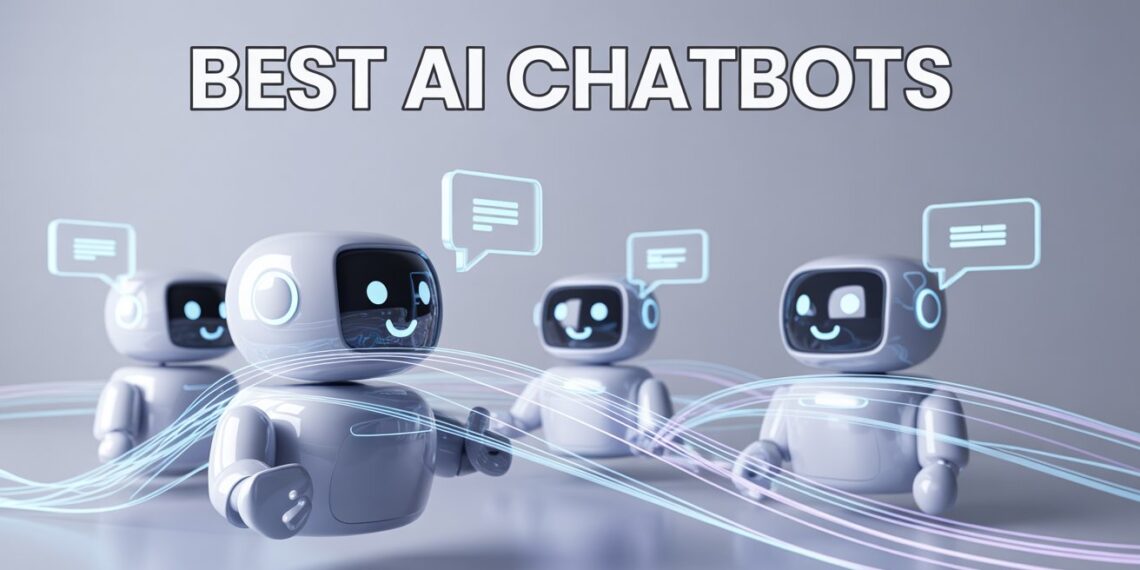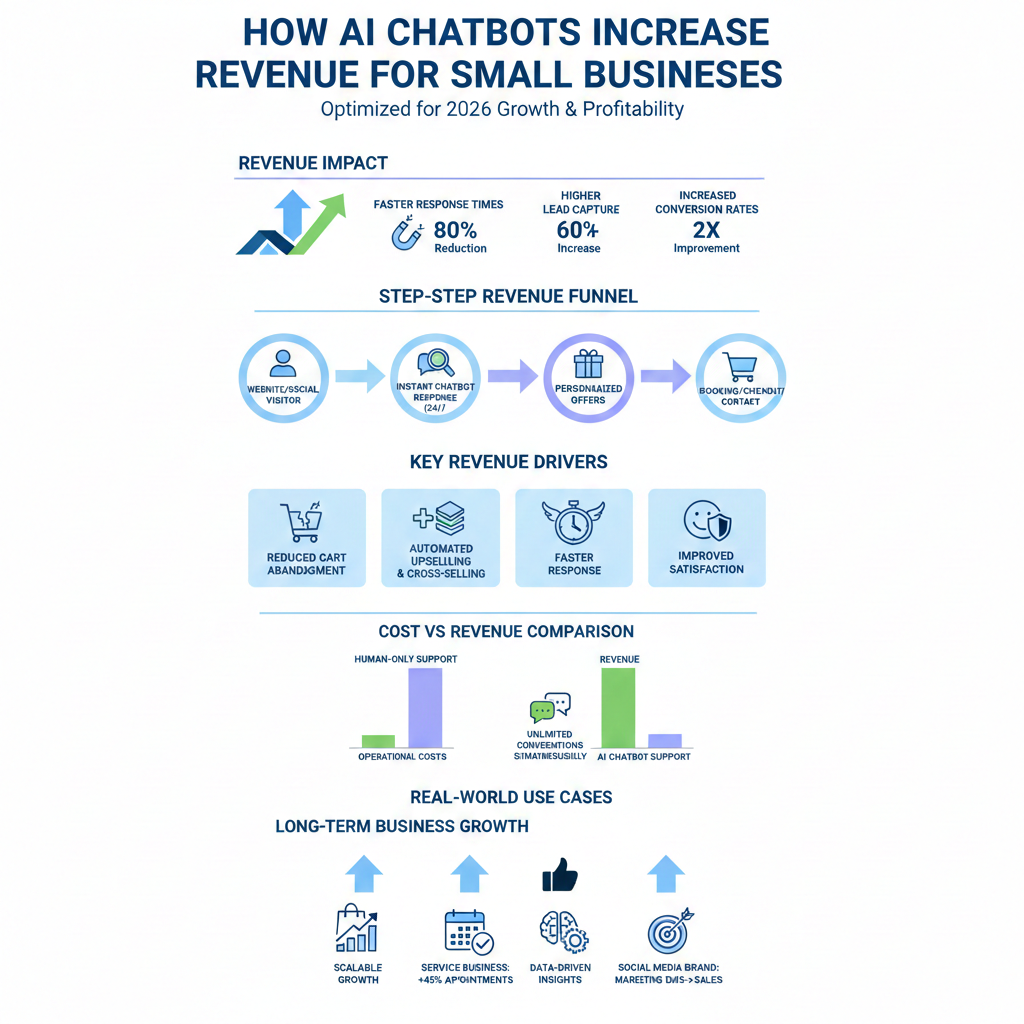For small business owners in 2026, speed and relevance matter more than ever. Customers no longer just want quick replies, they expect context-aware, personalized conversations across websites, social media, and messaging apps. At the same time, labor costs continue to rise, and hiring full-time support staff isn’t realistic for many small teams.
This is why AI chatbots have evolved from simple “FAQ bots” into revenue-driving digital assistants. The latest generation of chatbots uses large language models (LLMs), behavioral data, and CRM signals to understand intent, predict needs, and guide customers toward action, not just respond to questions.
In this updated 2026 guide, you’ll find:
-
Why AI chatbots are now a competitive necessity (not a luxury)
-
In-depth reviews of the best AI chatbots for small businesses in 2026
-
Clear comparisons showing which tools outperform others and why
-
Expert-style insights based on real-world usage patterns
-
Answers to common questions small business owners ask before adopting chatbots
-
Visual content ideas to improve engagement and SEO
Quick Picks: Best AI Chatbots for Small Businesses in 2026
-
Lindy – Best for workflow automation and AI-driven operations
-
Tidio – Best for eCommerce and real-time customer support
-
ManyChat – Best for Instagram, WhatsApp, and social commerce
-
ProProfs Chat – Best low-cost option for startups
-
Drift – Best for B2B lead qualification and high-ticket sales
-
HubSpot Chatbot – Best for CRM-based marketing automation
-
Botsify – Best for advanced customization and logic-based flows
-
Intercom – Best for scaling customer support as you grow
Why AI Chatbots Matter More in 2026 (Not Just 2025)
1. Customer Expectations Have Changed
According to multiple 2024–2025 CX studies, customers now expect responses within seconds, not minutes. Chatbots meet this demand by instantly handling repetitive questions, order tracking, and booking requests without burning out staff.
2. AI Has Shifted from Scripted to Predictive
Earlier chatbots followed rigid scripts. In 2026, modern chatbots analyze:
-
Past conversations
-
CRM data
-
User behavior (pages viewed, products clicked)
This allows them to predict intent for example, offering a discount to a hesitant buyer or escalating a high-value lead to a human agent automatically.
3. Real Cost Efficiency (Not Just “Automation Hype”)
Replacing even one entry-level support role can save thousands annually. More importantly, chatbots scale infinitely handling 10 or 10,000 conversations with the same performance.
4. Omnichannel Is No Longer Optional
Customers move between:
-
Website chat
-
Instagram DMs
-
WhatsApp
The best AI chatbots for small businesses in 2026 centralize these channels into one unified inbox, reducing missed leads and fragmented conversations.
Detailed Reviews: Best AI Chatbots for Small Businesses (2026 Edition)
1. Lindy
Best for AI workflow automation & internal operations
Lindy stands out in 2026 because it goes beyond customer chat. It acts as an AI operations assistant, automating internal workflows alongside customer conversations.
Why it’s different:
Lindy can trigger actions after conversations updating CRMs, sending follow-ups, or scheduling tasks automatically.
-
Best for: Agencies, consultants, service businesses
-
Pricing: Starts around $39/month
-
Expert insight: Businesses using Lindy often see faster deal cycles because leads are followed up instantly, without manual handoffs.
Limitations: Requires setup time to unlock full automation potential.
2. Tidio
Best for eCommerce support & live chat
Tidio excels at blending AI automation with human takeover, which is critical for online stores handling refunds, shipping, and pre-sale questions.
Why it works:
Its AI can resolve common eCommerce issues instantly while routing edge cases to live agents.
-
Best for: Shopify, WooCommerce, DTC brands
-
Pricing: Free plan; paid plans from $29/month
-
Real-world result: Many stores report higher checkout completion due to proactive cart assistance.
3. ManyChat
Best for social media & conversational marketing
ManyChat remains the leader for Instagram and WhatsApp automation, especially as social commerce continues growing in 2026.
What sets it apart:
It turns comments, story replies, and DMs into automated sales funnels.
-
Best for: Cafés, creators, local businesses, online sellers
-
Pricing: Free basic plan; Pro from $15/month
-
Expert take: If most of your traffic comes from social platforms, website chatbots alone are not enough ManyChat fills that gap.
4. ProProfs Chat
Best budget chatbot for small teams
ProProfs Chat focuses on simplicity and affordability, making it ideal for startups that want fast deployment without complexity.
-
Best for: Freelancers, consultants, small service firms
-
Pricing: Free plan; paid from $19/month
-
Trade-off: Less AI depth compared to premium tools, but reliable for basic automation.
5. Drift
Best for B2B sales & high-value leads
Drift is purpose-built for B2B conversations that lead to revenue, not just support tickets.
Why it’s powerful:
It qualifies visitors in real time and routes serious buyers directly to sales reps.
-
Best for: SaaS, enterprise services
-
Pricing: Starts around $2,500/month
-
Expert opinion: Overkill for small local businesses, but unmatched for B2B funnels.
6. HubSpot Chatbot
Best for CRM-driven marketing automation
HubSpot’s chatbot shines when paired with its CRM, enabling full-funnel visibility from first chat to closed deal.
-
Best for: Businesses already using HubSpot
-
Pricing: Free with CRM; advanced features require paid plans
-
Limitation: Less flexible outside HubSpot’s ecosystem.
7. Botsify
Best for advanced customization
Botsify allows detailed logic-based flows and multilingual support, making it ideal for niche use cases.
-
Best for: Education platforms, global businesses
-
Pricing: From $49/month
-
Drawback: UI feels dated compared to newer tools.
8. Intercom
Best for scaling customer support
Intercom remains one of the strongest platforms for growing businesses that need structure—tickets, onboarding, and proactive messaging in one system.
-
Best for: SaaS and fast-growing startups
-
Pricing: Starts at $74/month
-
Consideration: Costs rise as usage increases.
Feature & Pricing Comparison (2026)
Chatbot |
Best For |
Starting Price |
|---|---|---|
Lindy |
Workflow automation |
$39/month |
Tidio |
eCommerce support |
$29/month |
ManyChat |
Social media sales |
$15/month |
ProProfs |
Budget-friendly |
$19/month |
Drift |
B2B sales |
$2,500/month |
HubSpot |
CRM automation |
Free–Paid |
Botsify |
Custom logic flows |
$49/month |
Intercom |
Scalable support |
$74/month |
How to Choose the Right AI Chatbot in 2026
Step 1: Define the Core Objective
-
Support automation → Tidio, Intercom
-
Social media sales → ManyChat
-
B2B lead generation → Drift
-
Workflow automation → Lindy
Step 2: Budget Realistically
Low-cost tools save money upfront, but lost conversions cost more long-term.
Step 3: Plan for Growth
Switching platforms later is costly. Choose a chatbot that scales with your business.
Frequently Asked Questions (People Also Ask)
Are AI chatbots worth it for very small businesses?
Yes. Even solo founders use chatbots to capture leads and respond instantly without being online 24/7.
Will chatbots replace human support in 2026?
No. The most effective setups use chatbots for repetitive tasks and humans for complex or emotional cases.
Which chatbot has the best ROI?
ROI depends on use case. ManyChat often delivers the fastest ROI for social businesses, while Tidio excels in eCommerce.
Final Thoughts: AI Chatbots in 2026
AI chatbots in 2026 are no longer just support tools, they are growth enablers. From capturing leads to automating workflows and improving customer satisfaction, the right chatbot can outperform traditional methods at a fraction of the cost.
The best AI chatbots for small businesses in 2026 such as Lindy, Tidio, ManyChat, and Intercom each serve different goals. The smartest approach is choosing a platform that aligns with your customer journey today and where your business will be tomorrow.










